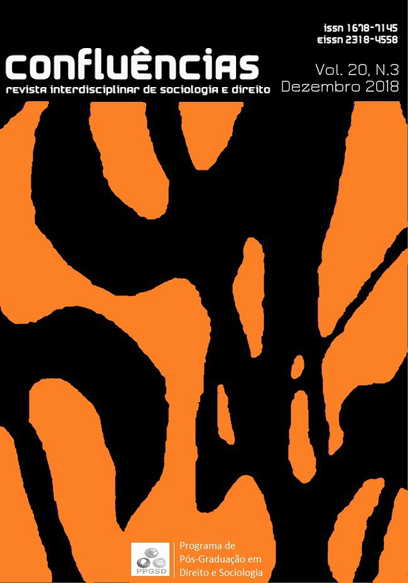NEUTRALIDADE CIENTÍFICA E CIÊNCIA JURÍDICA: as disfunções do paradigma positivista e suas influências no direito
DOI:
https://doi.org/10.22409/conflu20i3.p427Palavras-chave:
Modernidade, positivismo, positivismo jurídico, neutralidade científica.Resumo
Na modernidade, a ciência passou a exercer papel de primazia no que diz respeito às constatações da verdade e da falsidade acerca das coisas do mundo, em detrimento das demais formas de saber. Verificou-se, assim, a partir da racionalidade moderna, a supremacia do conhecimento científico. A cientificização do mundo, por sua vez, influenciou os demais campos do conhecimento, dentre os quais o próprio direito; advém, daí o positivismo jurídico. Ocorre, porém, que as características inerentes à ciência – dentre as quais, a neutralidade –, a partir da complexificação das relações sociais, passaram a se mostrar insuficientes para oferecer repostas às demandas dessa mesma sociedade, o que levou ao esgarçamento das disfunções desse paradigma positivista. Neste sentido, portanto, o presente artigo tem como proposta central contribuir com sobredito debate, investigando-se, de uma forma dialética e dialógica, justamente, quais os impactos e as influências das disfunções do paradigma positivista, notadamente, no que diz respeito à pretensão de neutralidade científica, no campo do direito.
Downloads
Referências
DIONNE, Jean; LAVILLE, Christian. A construção do saber: manual de metodologia da pesquisa em ciências humanas. Porto Alegre: Artmed, 1999.
FERRAZ JR., Tercio Sampaio. A ciência do direito. 2. ed. São Paulo: Atlas, 1980.
GALUPPO, Marcelo Campos. A epistemologia jurídica: entre o positivismo e o pós-positivismo. In: Revista do Instituto de Hermenêutica Jurídica – crítica à dogmática: dos bancos acadêmicos à prática dos tribunais. Vol. 01, nº 03, Porto Alegre: IHJ, 2005.
JAPIASSU, Hilton. O mito da neutralidade científica. ed. Imago, 1975.
KUHN, Thomas S. A estrutura das revoluções científicas. São Paulo: Perspectiva, 1975.
LAKATOS, Eva Maria; MARCONI, Maria de Andrade. Fundamentos de metodologia científica. 7. ed. São Paulo: Atlas, 2010.
MORIN, Edgar. Introdução ao pensamento complexo. 4. ed. Porto Alegre: Sulina, 2011.
SANTOS, Boaventura de Sousa. A crítica da razão indolente: contra o desperdício da experiência. 8. ed. São Paulo: Cortez, 2011.
______. A gramática do tempo: para uma nova cultura política. 3. ed. São Paulo: Cortez, 2010.
______. Para além do pensamento do pensamento abissal: das linhas globais a uma ecologia de saberes. In: Revista Crítica de Ciências Sociais, nº 78, Outubro, 2007.
______. Um discurso sobre as ciências. 7. ed. São Paulo: Cortez, 2010b.
WARAT, Luis Alberto. Senso comum teórico: as vozes incógnitas das verdades jurídicas. In: WARAT, Luis Alberto. Introdução geral ao direito: interpretação da lei: temas para uma reformulação. Porto Alegre: SaFe, 1994.
WOLKMER, Antônio Carlos. Ideologia, Estado e Direito. 3. ed. rev. e ampl. São Paulo: Revista dos Tribunais, 2000.
______. Introdução ao pensamento jurídico crítico. 4. ed. São Paulo: Saraiva, 2002.
Publicado
Edição
Seção
Licença
Os autores mantêm os direitos autorais e concedem à revista o direito de primeira publicação, com o trabalho simultaneamente licenciado sob a Licença Creative Commons Attribution que permite o compartilhamento do trabalho com reconhecimento da autoria e publicação inicial nesta revista. Têm autorização para assumir contratos adicionais separadamente, para distribuição não-exclusiva da versão do trabalho publicada nesta revista (ex.: publicar em repositório institucional ou como capítulo de livro), com reconhecimento de autoria e publicação inicial nesta revista. Possuem permissão e são estimulados a publicar e distribuir seu trabalho online (ex.: em repositórios institucionais ou na sua página pessoal) a qualquer ponto antes ou durante o processo editorial, já que isso pode gerar alterações produtivas, bem como aumentar o impacto e a citação do trabalho publicado.







